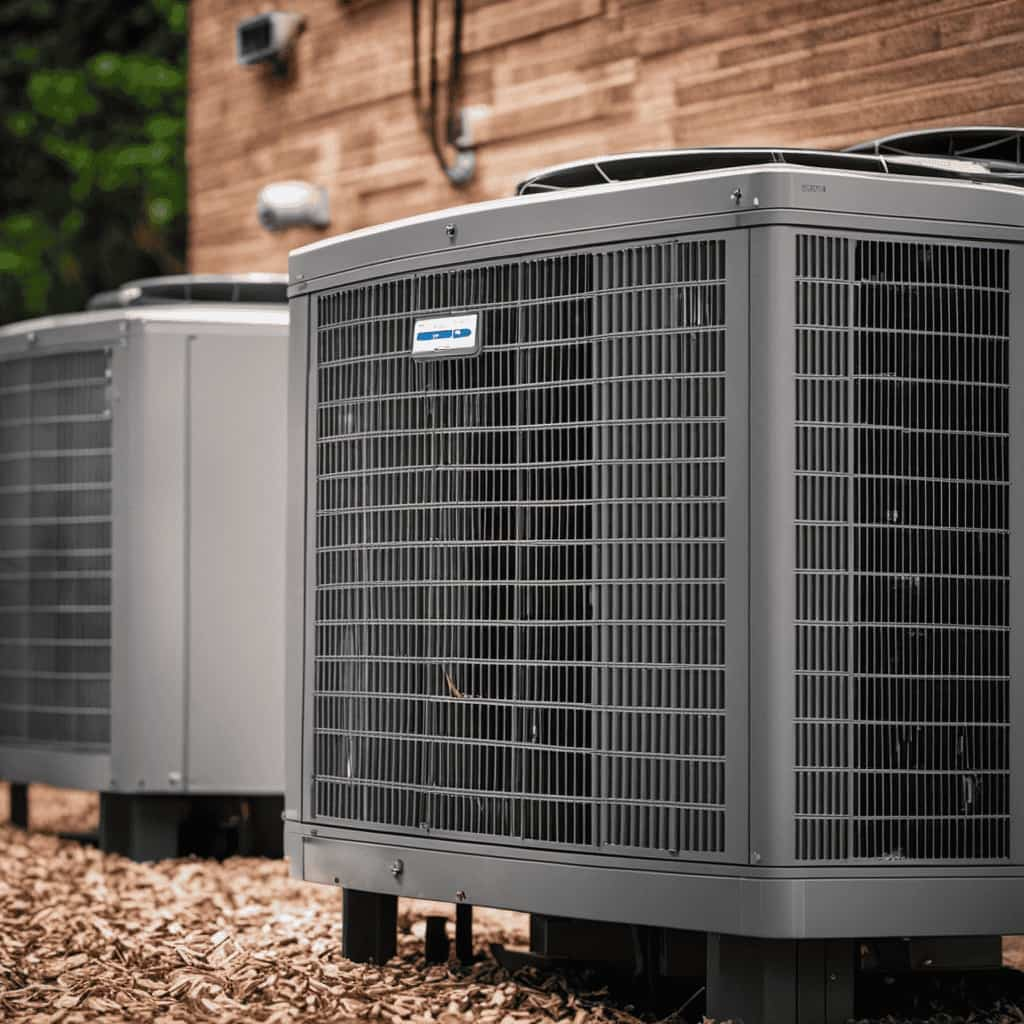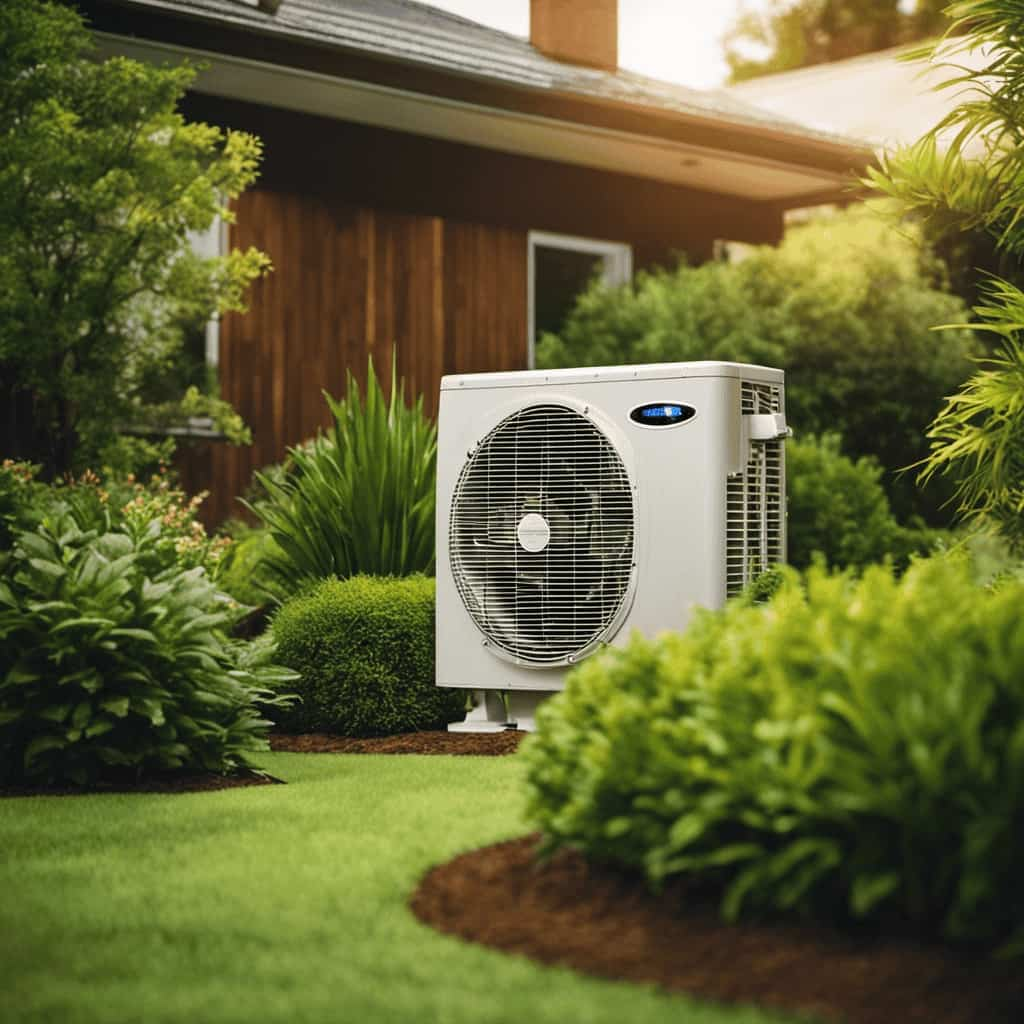Did you know that commercial buildings can lower their heating and cooling costs by up to 70% by using geothermal heat pumps?
In this article, we will explore how these innovative systems work, the environmental advantages they offer, and successful case studies of their implementation in commercial settings.
We will also discuss the challenges of integrating geothermal heat pumps and future trends in this technology.
Join us as we uncover the incredible potential of geothermal heat pumps for commercial buildings.

Key Takeaways
- Geothermal heat pumps utilize the constant temperature beneath the Earth’s surface for efficient heating and cooling.
- Geothermal heat pumps offer advantages such as improved indoor air quality, quieter operation, and longer lifespan compared to conventional HVAC systems.
- Geothermal heat pumps are highly energy-efficient, leading to significant cost savings for businesses.
- Geothermal heat pumps provide consistent comfort throughout the building and qualify for various government incentives and tax credits.
Understanding Geothermal Heat Pump Technology
We’re exploring geothermal heat pump technology and its benefits in commercial buildings.
When it comes to understanding this technology, it’s essential to grasp the basic principles behind it. Geothermal heat pumps work by harnessing the constant temperature beneath the Earth’s surface to heat and cool buildings efficiently. This technology utilizes a series of pipes, called loops, buried underground to transfer heat to or from the ground.
By tapping into this renewable energy source, commercial buildings can significantly reduce their reliance on traditional heating and cooling systems, resulting in lower energy costs and reduced carbon emissions. Geothermal heat pumps also offer advantages such as improved indoor air quality, quieter operation, and longer lifespan compared to conventional HVAC systems.
Understanding the ins and outs of geothermal heat pump technology is key to maximizing its benefits in commercial buildings.

Benefits of Geothermal Heat Pumps for Commercial Buildings
Let’s explore the numerous benefits that geothermal heat pumps offer to commercial buildings.
Geothermal heat pumps are a game-changer when it comes to heating and cooling systems. First and foremost, they’re incredibly energy-efficient, which means significant cost savings for businesses. These pumps tap into the constant temperature of the earth, providing a stable and reliable source of heating and cooling.
They also have a longer lifespan compared to traditional HVAC systems, reducing maintenance and replacement costs. Geothermal heat pumps are environmentally friendly, emitting fewer greenhouse gases and reducing dependence on fossil fuels. They’re also quiet and provide consistent comfort throughout the building.
Additionally, these systems qualify for various government incentives and tax credits, further maximizing their economic benefits.

How Geothermal Heat Pumps Work in Commercial Settings
When it comes to geothermal heat pumps in commercial settings, there are several key points to consider.
First and foremost, these systems offer significant cost-saving potential, thanks to their high efficiency and ability to tap into the Earth’s natural heat.
Additionally, geothermal heat pumps are known for their reliability, providing consistent heating and cooling throughout the year.
Cost-Saving Potential
Geothermal heat pumps offer commercial buildings a significant cost-saving potential. By harnessing the natural heat from the earth, these systems can provide both heating and cooling for a fraction of the cost of traditional HVAC systems. Let’s take a look at the cost-saving benefits of geothermal heat pumps in commercial settings.

| Cost-Saving Benefits | Explanation |
|---|---|
| Energy Efficiency | Geothermal heat pumps are highly efficient, using 25-50% less electricity compared to conventional systems. This translates to lower energy bills and significant cost savings over time. |
| Reduced Maintenance | Geothermal systems have fewer moving parts, resulting in less wear and tear. This means lower maintenance costs and reduced downtime for repairs. |
| Long Lifespan | Geothermal heat pumps typically have longer lifespans compared to traditional HVAC systems. With proper maintenance, these systems can last up to 25 years or more, reducing the need for frequent replacements and saving on replacement costs. |
| Incentives and Tax Credits | Many governments and utility companies offer incentives and tax credits for installing geothermal heat pumps. These financial incentives can further reduce the upfront costs and provide additional long-term savings. |
| Increased Property Value | Installing a geothermal heat pump can increase the value of a commercial property. The energy-efficient and sustainable nature of these systems is attractive to potential buyers or tenants, resulting in higher property values. |
Efficiency and Reliability
Our efficiency and reliability are key factors in understanding how geothermal heat pumps work in commercial settings.
When it comes to efficiency, geothermal heat pumps operate at high levels, providing a consistent and stable source of heating and cooling for commercial buildings. By harnessing the constant temperature of the earth, these pumps can efficiently transfer heat in a way that maximizes energy savings.
Additionally, our geothermal heat pumps are designed to be highly reliable. With proper maintenance and regular check-ups, they can provide reliable heating and cooling for many years. This reliability ensures that commercial buildings can operate smoothly and comfortably without any interruptions.
Cost Savings With Geothermal Heat Pumps in Commercial Buildings
When it comes to cost savings with geothermal heat pumps in commercial buildings, there are several key points to consider.

Firstly, the energy efficiency advantages of these systems can lead to significant reductions in operating costs.
Additionally, the long-term savings are increased as the reliance on traditional heating and cooling methods decreases.
Energy Efficiency Advantages
The cost savings offered by geothermal heat pumps in commercial buildings are significant. Not only do they provide efficient heating and cooling, but they also help reduce energy consumption and lower utility bills. By harnessing the natural heat from the earth, geothermal heat pumps can achieve energy efficiency levels that traditional HVAC systems can’t match.
To illustrate the potential cost savings, let’s take a look at the following table:

| Traditional HVAC System | Geothermal Heat Pump | |
|---|---|---|
| Initial Cost | High | Moderate |
| Operating Cost | High | Low |
| Lifespan | 15-20 years | 25+ years |
| Maintenance | Regular | Minimal |
| Energy Savings | Average | Significant |
As you can see, geothermal heat pumps not only have lower operating costs but also boast a longer lifespan and require less maintenance. These factors contribute to substantial energy savings over time, making geothermal heat pumps a wise investment for commercial buildings. By embracing this efficient technology, businesses can enjoy both financial benefits and a more sustainable future.
Lower Operating Costs
By reducing energy consumption and lowering utility bills, geothermal heat pumps offer significant cost savings in commercial buildings. These systems utilize the stable temperature of the earth to heat and cool buildings, which reduces the need for traditional heating and cooling methods that can be expensive to operate. By harnessing the Earth’s natural heat, geothermal heat pumps can deliver savings of up to 70% on heating and cooling costs. This translates into substantial cost reductions for commercial building owners and operators.
In addition to lower energy bills, geothermal systems also require less maintenance, further contributing to the overall cost savings. With geothermal heat pumps, commercial buildings can enjoy long-term financial benefits while also reducing their environmental impact.
Increased Long-Term Savings
To maximize our cost savings, we can harness the long-term benefits of geothermal heat pumps in commercial buildings. Here are three reasons why investing in geothermal heat pump systems can lead to increased long-term savings:

Energy Efficiency: Geothermal heat pumps are highly efficient, using the natural heat from the ground to regulate indoor temperatures. This reduces the reliance on traditional heating and cooling systems, resulting in lower energy consumption and reduced utility bills.
Maintenance and Lifespan: Geothermal heat pumps require less maintenance compared to conventional HVAC systems. With fewer parts and mechanical components, there’s less chance of breakdowns or system failures. Additionally, these systems have a longer lifespan, meaning fewer replacements and repair costs over time.
Incentives and Tax Benefits: Many governments and utility companies offer incentives and tax credits for installing geothermal heat pump systems. These financial incentives can significantly offset the upfront installation costs, making it a more affordable option for commercial buildings.
Environmental Advantages of Geothermal Heat Pump Systems
We can experience numerous environmental benefits from using geothermal heat pump systems in commercial buildings. By harnessing the constant temperature of the earth, these systems provide a sustainable and efficient way to heat and cool our buildings.

One significant advantage is the reduction in greenhouse gas emissions. Geothermal heat pumps use a small amount of electricity to transfer heat, resulting in significantly lower carbon emissions compared to traditional heating and cooling systems.
Additionally, these systems don’t rely on fossil fuels, reducing our dependence on finite resources.
Another environmental benefit is the conservation of water. Unlike cooling towers used in traditional HVAC systems, geothermal heat pumps don’t consume large amounts of water. This helps to preserve this precious resource while still providing effective temperature control.
Embracing geothermal heat pump systems in commercial buildings isn’t only a smart financial decision but also a responsible choice for the environment.

Assessing the Viability of Geothermal Heat Pump Systems for Commercial Use
When considering the viability of geothermal heat pump systems for commercial use, we need to assess two crucial points: cost-effectiveness and environmental impact.
Firstly, the cost-effectiveness of geothermal systems lies in their ability to significantly reduce energy consumption and operating costs in the long run.
Secondly, the environmental impact of geothermal systems is minimal, as they utilize renewable energy sources and produce fewer greenhouse gas emissions compared to traditional heating and cooling systems.
Cost-Effectiveness of Geothermal
One of the key factors in determining the viability of geothermal heat pump systems for commercial use is the upfront cost. While geothermal systems tend to have higher initial expenses compared to traditional heating and cooling systems, they offer significant long-term cost savings.

Here are some reasons why geothermal heat pump systems can be cost-effective for commercial buildings:
Lower energy bills: Geothermal systems utilize the constant temperature of the earth to heat and cool buildings, resulting in reduced energy consumption and lower utility bills.
Long lifespan: Geothermal heat pump systems have a longer lifespan compared to traditional systems, which means fewer replacement costs over time.
Tax incentives and rebates: Many governments offer incentives and rebates for installing geothermal systems, helping to offset the upfront costs.

Environmental Impact of Geothermal
Assessing the viability of geothermal heat pump systems for commercial use requires evaluating their environmental impact. When considering the environmental benefits of geothermal, we must first acknowledge its potential to significantly reduce greenhouse gas emissions.
Geothermal systems utilize the natural heat stored beneath the Earth’s surface, eliminating the need for fossil fuel combustion and reducing carbon dioxide emissions. This not only helps combat climate change but also improves air quality by minimizing the release of pollutants.
Additionally, geothermal systems consume less energy compared to traditional heating and cooling methods, resulting in lower demand on the electrical grid. By harnessing the Earth’s renewable energy, geothermal heat pump systems offer a sustainable solution that aligns with the growing demand for environmentally friendly practices in commercial buildings.
Design Considerations for Geothermal Heat Pump Installations in Commercial Buildings
We should consider various factors when designing geothermal heat pump installations in commercial buildings. Here are some important considerations:

Building Size and Layout: The size and layout of the building will determine the number and size of heat pumps required. It’s crucial to ensure that the system is designed to efficiently heat and cool all areas of the building.
Geological Conditions: The geological conditions of the site, such as soil composition and water availability, will impact the design of the geothermal system. Conducting a thorough site survey is essential to determine the feasibility and effectiveness of the installation.
System Integration: Integrating the geothermal heat pump system with other building systems, such as ventilation and air conditioning, is crucial to optimize energy efficiency. Proper coordination and design are necessary to ensure seamless integration and maximize the benefits of the system.
Considering these factors will help ensure a well-designed geothermal heat pump installation that provides efficient heating and cooling for commercial buildings.

Maintenance and Upkeep of Geothermal Heat Pump Systems in Commercial Settings
To ensure optimal performance, we must regularly maintain and upkeep geothermal heat pump systems in commercial settings. Just like any other mechanical system, geothermal heat pump systems require routine maintenance to continue operating efficiently and effectively.
Regular maintenance includes tasks such as:
- Cleaning or replacing air filters
- Inspecting and cleaning the heat exchanger
- Checking and adjusting refrigerant levels
- Ensuring proper airflow
Additionally, it’s crucial to schedule annual inspections by a qualified technician to identify and address any potential issues before they become major problems.
Case Studies: Successful Implementation of Geothermal Heat Pumps in Commercial Buildings
In our research, we’ve found several case studies that demonstrate the successful implementation of geothermal heat pumps in commercial buildings. These case studies provide real-world examples of how geothermal heat pumps have been effectively utilized to provide heating and cooling solutions in various commercial settings.

Here are a few key findings from these case studies:
- The installation of geothermal heat pump systems resulted in significant energy savings for the commercial buildings, reducing their reliance on traditional heating and cooling methods.
- These systems also improved the indoor air quality and comfort levels for occupants, creating a more pleasant and productive working environment.
- The long-term cost savings of implementing geothermal heat pumps were evident, with many buildings experiencing a return on investment within a few years.
These case studies highlight the successful integration of geothermal heat pumps in commercial buildings, paving the way for more widespread adoption in the future.
Now, let’s explore the challenges that need to be overcome in order to fully harness the benefits of geothermal heat pumps in commercial settings.
Overcoming Challenges in Geothermal Heat Pump Integration for Commercial Use
One of the key challenges in integrating geothermal heat pumps for commercial use is the limited availability of suitable geothermal resources in certain regions. This can be a significant barrier for businesses that want to harness the benefits of geothermal energy for their heating and cooling needs.

However, there are solutions available to overcome this challenge. One option is to explore the use of ground source heat pumps, which can extract heat from the soil or groundwater even in areas without direct access to geothermal resources.
Another approach is to consider the feasibility of drilling deeper geothermal wells to tap into deeper, more abundant geothermal reservoirs. By exploring these alternatives and working with experienced geothermal professionals, businesses can find ways to overcome the challenges and successfully integrate geothermal heat pumps in their commercial buildings.
Future Trends and Innovations in Geothermal Heat Pump Technology for Commercial Buildings
Our industry experts predict exciting advancements in geothermal heat pump technology for commercial buildings. Here are some of the future trends and innovations we can expect:
Improved efficiency: Geothermal heat pumps will become even more efficient, reducing energy consumption and operating costs.

Enhanced control systems: Advanced control systems will allow for better monitoring and optimization of geothermal heat pump performance, ensuring optimal comfort and energy savings.
Integration with renewable energy sources: Geothermal heat pumps will be seamlessly integrated with other renewable energy sources, such as solar panels or wind turbines, maximizing energy efficiency and reducing carbon footprint.
These advancements will revolutionize the way commercial buildings are heated and cooled, making them more sustainable and environmentally friendly. With increased efficiency and control, building owners can expect significant energy savings and improved comfort for occupants.
Exciting times lie ahead for geothermal heat pump technology in commercial buildings.

Frequently Asked Questions
Are There Any Government Incentives or Rebates Available for Installing Geothermal Heat Pump Systems in Commercial Buildings?
Yes, there are government incentives and rebates available for installing geothermal heat pump systems in commercial buildings. These incentives and rebates can help offset the initial costs and make the investment more financially feasible.
What Is the Typical Lifespan of a Geothermal Heat Pump System in a Commercial Building?
Well, let me tell you, the lifespan of a geothermal heat pump system in a commercial building is nothing short of impressive. These bad boys can last up to 25-50 years, providing efficient heating and cooling all the way. It’s a long-term investment, my friend.
Can Geothermal Heat Pump Systems Be Retrofitted Into Existing Commercial Buildings, or Are They Only Suitable for New Construction?
Yes, geothermal heat pump systems can be retrofitted into existing commercial buildings. They are not only suitable for new construction but also offer energy-efficient and cost-effective solutions for improving heating and cooling in older buildings.
How Do Geothermal Heat Pumps Compare in Terms of Energy Efficiency to Other HVAC Systems Commonly Used in Commercial Buildings?
How do geothermal heat pumps compare in energy efficiency to other HVAC systems commonly used in commercial buildings? Are they a cost-effective and sustainable solution for reducing energy consumption and greenhouse gas emissions?

Are There Any Limitations or Considerations for Using Geothermal Heat Pump Systems in Regions With Extreme Climates or Geological Conditions?
There are limitations and considerations when using geothermal heat pump systems in regions with extreme climates or geological conditions. These factors can affect the efficiency and effectiveness of the system, requiring careful planning and design.
Why Should Commercial Buildings Consider Using Home Geothermal Heat Pumps?
Commercial buildings can greatly benefit from utilizing home geothermal heat pumps. These pumps provide incredible benefits of geothermal heat pumps, such as significantly lower operating costs, reduced carbon footprint, and improved heating and cooling efficiency. By harnessing the Earth’s natural energy, commercial buildings can enjoy sustainable and cost-effective heating and cooling solutions.
Conclusion
In conclusion, harnessing the power of geothermal heat pumps in commercial buildings is a game-changer. This technology not only provides cost savings but also offers environmental benefits.
It’s like unlocking a hidden treasure beneath our feet, tapping into the Earth’s natural warmth to heat and cool our buildings. With ongoing advancements and innovations, the future looks bright for geothermal heat pump technology in commercial settings.
So, let’s embrace this renewable energy source and pave the way for a sustainable future.










